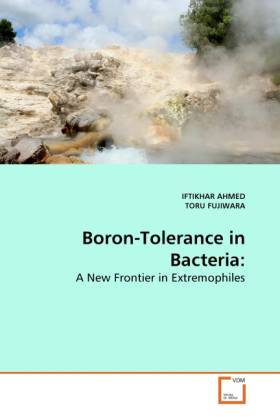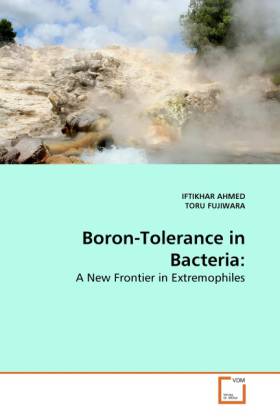
Je cadeautjes zeker op tijd in huis hebben voor de feestdagen? Kom langs in onze winkels en vind het perfecte geschenk!
- Afhalen na 1 uur in een winkel met voorraad
- Gratis thuislevering in België vanaf € 30
- Ruim aanbod met 7 miljoen producten
Je cadeautjes zeker op tijd in huis hebben voor de feestdagen? Kom langs in onze winkels en vind het perfecte geschenk!
- Afhalen na 1 uur in een winkel met voorraad
- Gratis thuislevering in België vanaf € 30
- Ruim aanbod met 7 miljoen producten
Zoeken
Boron-Tolerance in Bacteria:
A New Frontier in Extremophiles
Iftikhar Ahmed, Toru Fujiwara
Paperback | Engels
€ 62,45
+ 124 punten
Omschrijving
Several classes of microorganisms have been recognized as extremophiles inhabiting in an extreme environments of heat or cold, pH, salinity, pressure, and even radiation. These extremophiles, having many interesting biological secrets, provide a novel source of discoveries in applied and basic sciences. We studied a new frontier in extremophiles, i.e., microorganisms tolerating toxic levels of boron. Boron (B), a non-metal micronutrient, has been known to be essential for plants since long. Some animals and unicellular eukaryotes also require B but the level of requirement differs among various organisms. On the other hand, B is toxic to living cells when present above a certain threshold. Environmental B toxicity occurs in many parts of the world and B contaminated soils are difficult to ameliorate. Due to its toxic effects for microorganisms, B has been used as a food preservative. During these studies, several novel species of boron-requiring and boron- tolerant bacteria have been identified. Among these, Bacillus boroniphilus was found to be very interesting. It not only needs boron but also highly tolerant to toxic concentration of boron.
Specificaties
Betrokkenen
- Auteur(s):
- Uitgeverij:
Inhoud
- Aantal bladzijden:
- 84
- Taal:
- Engels
Eigenschappen
- Productcode (EAN):
- 9783639258905
- Verschijningsdatum:
- 18/08/2010
- Uitvoering:
- Paperback
- Afmetingen:
- 152 mm x 229 mm
- Gewicht:
- 136 g

Alleen bij Standaard Boekhandel
+ 124 punten op je klantenkaart van Standaard Boekhandel
Beoordelingen
We publiceren alleen reviews die voldoen aan de voorwaarden voor reviews. Bekijk onze voorwaarden voor reviews.









